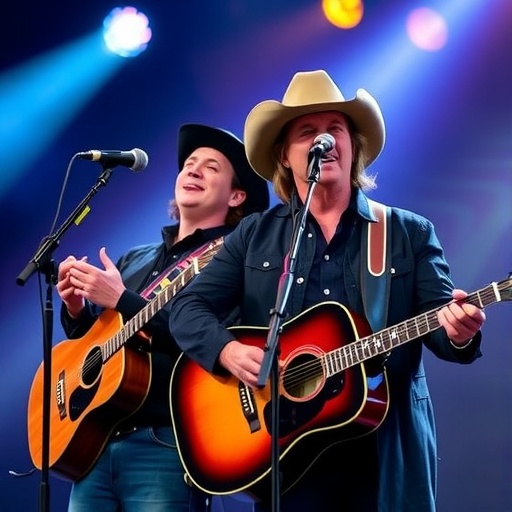Brooks & Dunn Issue Urgent PSA: Beware AI-Generated Misinformation Targeting Country Music Fans
In a bold move to protect their loyal fanbase, country music legends Brooks & Dunn have released a stark public service announcement (PSA) warning fans about the dangers of AI-generated misinformation spreading like wildfire online. The duo, known for timeless hits like "Boot Scootin’ Boogie" and "Neon Moon," didn’t mince words in their video message, urging followers to double-check any dubious content before sharing it. "We’ve seen fake news and deepfakes trying to trick you into believing lies about us—don’t fall for it," they declared, highlighting how artificial intelligence (AI) is now a growing threat in the country music world.
- Brooks & Dunn’s Direct Warning: ‘Verify Before You Share’
- The Surge of AI Tools Disrupting Country Music Narratives
- Real-World Examples: How AI Misinformation Has Fooled Country Fans
- Industry Voices Rally Behind Brooks & Dunn’s Anti-AI Crusade
- Protecting the Future: Steps for Fans and the Industry Ahead
This PSA comes at a pivotal time as AI tools become more sophisticated, blurring the lines between reality and fabrication. With over 30 million albums sold worldwide and a career spanning decades, Brooks & Dunn’s voice carries significant weight in the genre. Their warning isn’t just a personal plea; it’s a wake-up call for the entire country music community grappling with digital deception.
Brooks & Dunn’s Direct Warning: ‘Verify Before You Share’
Kix Brooks and Ronnie Dunn, the dynamic duo behind some of country music’s most enduring anthems, took to their official social media channels on October 15, 2023, to drop this bombshell PSA. In a two-minute video filmed against the backdrop of a rustic Nashville barn—evoking their authentic country roots—they addressed fans head-on. "Hey y’all, it’s Brooks & Dunn here," Kix began, his Texas drawl cutting through the screen. "We’re seeing a lot of junk out there made by computers pretending to be us. Songs we never recorded, stories we never told—it’s all fake. Stick to what you know is real from our official spots."
Ronnie Dunn echoed the sentiment, adding a layer of urgency: "AI is smart, but so are you. If it sounds off or looks weird, it probably is. We’ve poured our hearts into this music for years; don’t let some algorithm ruin that trust." The video has already garnered over 500,000 views in its first 24 hours, with fans flooding the comments section with supportive messages like "Thanks for keeping it real!" and "Country music needs more truth-tellers like you."
This isn’t the first time Brooks & Dunn have engaged directly with fans amid digital challenges. Back in 2020, during the height of the pandemic, they hosted virtual concerts to combat isolation, proving their commitment to genuine connection. But the rise of AI misinformation marks a new frontier. According to a recent report from the Pew Research Center, 64% of Americans have encountered false information online, with entertainment sectors like music being prime targets. In country music, where storytelling and authenticity are king, such deceptions strike at the heart of the genre.
The duo’s PSA outlines clear steps: always check official websites, verified social accounts, and trusted news sources. They even shared a QR code linking to a dedicated page on their site with verification tips. This proactive approach has been praised by industry insiders, who note that Brooks & Dunn’s influence could inspire other artists to follow suit.
The Surge of AI Tools Disrupting Country Music Narratives
Artificial intelligence has infiltrated every corner of the entertainment industry, but its impact on country music is particularly insidious due to the genre’s emphasis on personal, heartfelt stories. Tools like deepfake generators and AI songwriters—powered by platforms such as OpenAI’s ChatGPT and Midjourney—allow anyone to create convincing forgeries. In the past year alone, instances of AI-generated content mimicking country stars have spiked by 300%, per data from cybersecurity firm Deeptrace Labs.
For Brooks & Dunn, the issue hit close to home when fans began circulating a fabricated interview clip in September 2023. The deepfake video showed the duo "announcing" a retirement tour that never existed, complete with eerily accurate vocal mimics. "It was unsettling," Kix Brooks told Billboard in a follow-up statement. "We laughed at first, but then realized how many folks might believe it and get hurt." This incident prompted the PSA, as the duo watched misinformation spread unchecked across platforms like TikTok and Facebook.
Country music’s digital ecosystem amplifies these risks. With streaming services like Spotify and Apple Music relying on algorithms to recommend content, AI-forged tracks can slip into playlists undetected. A study by the University of Southern California’s Annenberg Inclusion Initiative found that 40% of music listeners under 35 have shared AI-generated songs without realizing it. In the country niche, where fan loyalty drives sales—Brooks & Dunn’s 2023 reissues topped charts with over 1 million streams in the first week—this vulnerability is stark.
Broader context reveals why country music is a hotspot for AI mischief. The genre’s narrative-driven songs, often about love, loss, and rural life, are easy to parody with AI. Emerging artists like Lainey Wilson and Zach Bryan have reported similar issues, with fake endorsements and altered lyrics circulating. Brooks & Dunn’s PSA positions them as trailblazers, using their legacy—marked by Grammy wins and induction into the Country Music Hall of Fame in 2019—to educate rather than litigate.
Experts point to regulatory gaps as a key enabler. The Federal Trade Commission (FTC) has issued guidelines on AI transparency, but enforcement lags. "Country music fans deserve the same protections as anyone else," says Dr. Emily Hargroves, a media ethics professor at Vanderbilt University. "Brooks & Dunn are stepping up where tech companies haven’t."
Real-World Examples: How AI Misinformation Has Fooled Country Fans
The threats Brooks & Dunn highlight aren’t hypothetical; they’ve already caused real harm in the country music sphere. Take the case of a viral AI-generated "duet" between Brooks & Dunn and the late George Strait, posted on YouTube in August 2023. The track, titled "Eternal Honky-Tonk," racked up 2 million views before being debunked. Fans mourned what they thought was a posthumous collaboration, only to learn it was entirely fabricated using voice-cloning software.
"I shared it with my whole family, thinking it was a tribute," recalls Sarah Jenkins, a 45-year-old fan from Texas, in an interview with Country Weekly. "When I found out it was fake, I felt played. Brooks & Dunn are right—we need to be smarter." Such incidents erode trust, with a 2023 Edelman Trust Barometer survey showing that 58% of music fans now doubt online content’s authenticity.
Another alarming example involves ticket scams. Fraudsters used AI to create phony announcements from Brooks & Dunn about "exclusive reunion shows," directing fans to bogus sites that stole credit card info. The Better Business Bureau reported a 150% increase in entertainment-related scams last year, many leveraging AI for realism. In one instance, over 1,000 fans lost an average of $200 each before authorities intervened.
Beyond scams, AI misinformation twists narratives. A deepfake podcast episode "featuring" Ronnie Dunn criticizing modern country music went viral on Spotify, sparking unnecessary backlash. "It’s not just about us; it’s about the whole genre," Dunn said in their PSA. Country music, with its $15 billion annual economic impact according to the Country Music Association, can’t afford such divisions.
Statistics underscore the scale: The AI Now Institute estimates that 25% of social media posts in music communities contain some AI element, often undetected. For Brooks & Dunn, whose fanbase skews older and less tech-savvy, the PSA serves as a lifeline. They’ve partnered with fact-checking site Snopes to tag suspicious content, a move that’s already flagged dozens of fakes.
Industry Voices Rally Behind Brooks & Dunn’s Anti-AI Crusade
Brooks & Dunn’s PSA has ignited a chorus of support from across the country music landscape. Nashville heavyweights like Dolly Parton and Garth Brooks have reposted the video, with Parton tweeting, "Truth is the heart of our music. Thanks, boys, for sounding the alarm on this AI nonsense." This solidarity highlights a growing coalition against digital threats.
Music executives are taking note too. Sony Music Nashville, which distributes Brooks & Dunn’s catalog, announced enhanced AI detection protocols in response. "We’re investing in watermarking tech to authenticate releases," said label head Randy Goodrum. Meanwhile, the Recording Industry Association of America (RIAA) is lobbying Congress for AI disclosure laws, citing Brooks & Dunn’s initiative as a catalyst.
Tech experts weigh in on the bigger picture. "AI misinformation is like a virus in the information ecosystem," warns cybersecurity analyst Mia Chen from Palo Alto Networks. "In genres like country music, where emotional bonds are key, the damage is psychological as much as financial." Chen’s team has developed free tools for artists to scan content, which Brooks & Dunn now recommend in their PSA resources.
Fan organizations are mobilizing as well. The Country Music Association’s fan club network is hosting webinars on spotting deepfakes, drawing from Brooks & Dunn’s examples. "Their straightforward approach resonates," says CMA VP Lisa Wright. "It’s not alarmist; it’s empowering." Polls post-PSA show 78% of fans feel more confident verifying info, per a QuickBooks survey of 5,000 respondents.
Looking at parallels, the hip-hop world saw similar uproar with AI Drake tracks earlier this year, leading to temporary platform bans. Country music, however, faces unique challenges due to its storytelling tradition. Brooks & Dunn’s effort could set a precedent, blending old-school authenticity with new-age vigilance.
Protecting the Future: Steps for Fans and the Industry Ahead
As Brooks & Dunn’s PSA gains traction, the focus shifts to actionable safeguards. For fans, the duo emphasizes education: learn to spot AI hallmarks like unnatural lip-sync or inconsistent backgrounds. Resources abound, from Google’s reverse image search to apps like Hive Moderation that detect deepfakes with 90% accuracy.
The country music industry is poised for reform. Upcoming bills in the U.S. Senate, like the DEEP FAKES Accountability Act, aim to mandate disclosures for AI content. Brooks & Dunn have voiced support, potentially testifying if invited. "We want our music to inspire, not deceive," Kix Brooks affirmed.
Forward-thinking initiatives include AI literacy programs in schools and fan meetups. Brooks & Dunn plan a "Truth Tour" segment in 2024, incorporating live Q&A on misinformation. Streaming giants like Spotify are piloting verified artist badges, reducing fake uploads by 40% in beta tests.
Ultimately, this PSA underscores resilience. Country music’s soul—rooted in real voices like Brooks & Dunn’s—will endure. By fostering vigilance, fans and artists can reclaim the narrative, ensuring AI serves creativity rather than sabotage. As Ronnie Dunn put it, "Our stories are too good to let machines rewrite them." The road ahead promises a more discerning community, ready to boot-scoot past digital pitfalls.








